Everyone complains that MPs these days are crashingly dull, but the recent return of one of the few who is not has given many people the vapours. Most of the Labour supporters I know regard George Galloway as something between a snake and a toad, and his recent victory a dark day for democracy. I don't know if this makes me more frivolous than them, or perhaps just less tribal, but for the life of me I cannot see it that way, Westminster being short on electrifyingly fearless maverick socialists. "Do you like him?" asked one friend, appalled and incredulous – and I do – but really it's more a question of enjoying him.
It has only been a fortnight since Galloway, 57, took his seat in the Commons, and already what theatre. He was sworn in to a deathly quiet chamber, but set the BBC's Question Time ablaze later that week, reviving the all-but-forgotten tradition of public debate as blood sport. Other dramas have been less predictable, if rather more farcical. Two days after winning Bradford West by a landslide, he wed his researcher, 30 years his junior, who he has known for six months, in an Islamic ceremony in Amsterdam. Three days later, the mother of his two sons – one of whom is just five months old – popped up, claiming that in the eyes of Islam he's still married to her. Then, last week, Jemima Khan declared in the New Statesman that Galloway converted to Islam in a London hotel 10 years ago, in a ceremony attended by someone she knew. The MP is always described as a Catholic, but under Islamic law, Khan pointed out, a Muslim woman cannot marry a non-Muslim – and Galloway's new bride is his third Muslim wife. By teatime, threats of libel writs were flying, raising the surreal prospect of a scion of the Goldsmith dynasty disputing the finer points of Islamic theology with a socialist firebrand from Dundee. And so the bizarre caravan of sensation and suspicion that follows Galloway wherever he goes is back on the road.
When we met 10 days ago he had a more mundane matter on his mind, and it was easy to guess what, because I found him camped with his staff around a cafe table in the public foyer of Portcullis House, next to a sign saying: "George Galloway MP Office." With no office yet assigned, or security passes issued to his staff, the team and their picnic of laptops and coffee cut a comically renegade picture, which seems to both suit and insult the MP in equal measure: "Laughable, isn't it?" He suspects there's more to it than mere administrative oversight, and observes with offhand pride that "most people here probably half-fear, half-hate me". He couldn't care less though, he adds, because he has never been happier.
"Coming back in here was the best day of my life. The US Senate hearing [to which he gave evidence in 2005] was my greatest day, until 29 March. Winning that election on 29 March, in the way that we did, with the landslide that we did, was definitely the best day of my life." What is his ambition now? "I don't have any political ambitions at all."
Galloway may no longer fancy himself for foreign secretary, but soon he's talking excitedly about getting a Respect mayor elected this year. The fact that his party has so far failed to produce a single other household name – even Respect's leader, Salma Yaqoob, is hardly that – doesn't discourage him at all, though he concedes it is disappointing. "Although – to be honest with you – the party became extremely small."
Really? At times it has claimed a membership of 10,000. "We were never that big, actually," he admits. "At our height, we probably had 3-4,000 members. When we lost the three parliamentary seats in 2010 that we'd hoped to win, we became almost minuscule." How minuscule? "About 8-900 people." In fact, he goes on, "it was probably winding down," and had he not won in Bradford would probably be dead. Yet now: "Put your house on it – we will win the mayoralty of Bradford in November."
That's funny, I laugh, because last time we met, in 2006, he told me to put my house on Respect winning Tower Hamlets council. Galloway's predictions are the stuff of legend, delivered with grand declamatory flourishes, like declarations of war. "I'm the one that stood up and confronted Mrs Thatcher [in 1992]," he reminds me at one point, "and said, on the eve of the fall of Kabul [to the Islamist mujahideen]: 'I tell you now, you have opened the gates to the barbarians, and a long, dark night will now descend upon the people of Afghanistan.' That's what I said two days before the fall of Kabul." That's quite a feat of recall – and he was right then, but I have always wanted to know how such impregnable confidence can keep going when predictions are proved wrong, as his was in Tower Hamlets. The answer, it turns out, is quite easy – those ones are clean forgotten. "Did I? Did I predict that?" he blinks in surprise. "Oh well, I was wrong that time."
But in a beat he is pointing out all the times he has been right – about Iraq, about Afghanistan, about winning Bradford West. He has also been astonishingly astute when it comes to defamation suits – to the tune of about £3m, "though most of it went to the lawyers." Galloway's houses in Portugal and south London were largely paid for by newspapers unwise enough to provoke him, and he has never lost a libel case. I'm quite surprised he hasn't sued over all the press reports that he arrived at his Bradford victory party in a Hummer, for "as God's my judge," he swears, "I've never been in a Hummer, nor will I ever be in a Hummer." But I'm curious to hear what he thinks he has got wrong in his political career.
"Well, I have been too brutal in dealing in political argument, and that has, unnecessarily, made enemies." I have to say, it didn't look like a lesson he had taken too close to heart when he let rip on Question Time. "But my main political mistake, in retrospect, was that state ownership of the means of production, distribution and exchange, in which I believed, and for which I campaigned, was a false God." Is that painful to admit? "Yes. I'm not saying, at all, that everything in the private garden is rosy. There's just more flowers than there were in the state garden. I'm sorry to say that, and yes, it is painful."
Galloway's politics today would still be regarded as lunacy by the right, but may be closer to those of more on the left than Labour perhaps realises. Were he to wake up in No 10 tomorrow, "We would bring all our soldiers home from foreign wars – thus saving billions of pounds. We would scrap the renewal of Trident submarines. And we would pursue what Vince Cable said was the £100bn-a-year-plus tax avoidance and tax evasion industry. Thus, we'd have no deficit. If you do the maths, if we did those three things we not only would have no deficit, we'd be quids in. We'd be £80bn up."
I wonder what the markets would make of this solution. "But you once believed in it, Decca." The reproof is softly teasing, but disarming, calculated to invoke guilt – and for a moment it works, until I remember he knows next to nothing about me or my politics, and laugh. But in that moment I glimpse the force of his famous charisma. It takes a lot to get traditional Muslim women in niqabs out canvassing for a Scot who dressed up in a leotard and pretended to be a cat on Celebrity Big Brother. It's even harder to think of anyone else in Westminster who could carry it off.
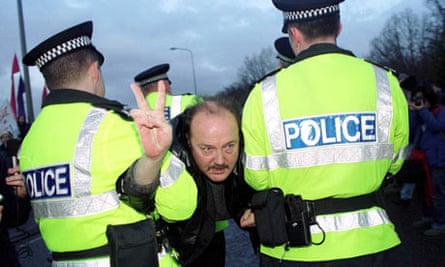
He claims to be less confident than we might think, though. "I feel self-conscious among educated, upper-class people. Insecure and uncomfortable." Is that why he deploys a vocabulary that would shame all but the extended edition of Roget's Thesaurus? "I think that's right, yeah. I think that's right. I feel an under-educated, working-class person. And, therefore, in the presence of some well-educated, upper-class people, I can feel uncomfortable and insecure."
How else does that feeling manifest itself? After a long, thoughtful pause, he says quietly: "Wishing I weren't there; wishing I could turn round and go away; wishing the ground would swallow me up."
I'm pretty sure that's why he boasts so much. He's a lot less self-aggrandising than the last time we met – but back then he had just emerged from the Big Brother house, so was probably feeling less secure than he does now. In fact, he says a lot of things that don't accord with his reputation. For example, he is frequently portrayed as a rogue for whom the ends always justify the means – but despite winning 75% of the postal vote in Bradford West, he is campaigning for postal voting to be banned.
"We are totally against postal voting on demand. Postal votes used to be something you got when you literally could not get to the polls; now they're available on demand and, once granted, are yours for ever. So large numbers of postal votes are delivered to places where the person no longer is. Large numbers of them are collected, unfilled-in, by these biradari chiefs," an Urdu word meaning clan seniors. "It's a kind of ritual that they bring votes to the candidate to show them: "Look, I'm bringing in 20 votes; that's 20 votes for you – I'm bringing that in.'" How can he be so sure?
"Well, I know it because they offered to do it to me. Yeah, and I said: 'I don't want to see anybody's vote, and I don't want you to see anybody's vote.' Now, I don't know that they filled them in, rather than the voter, but it's a fair inference; it's a fair inference if someone has got 20 votes in their pocket to take to the town hall, that they were either visibly observing the person filling the vote in – which is wrong, and I think illegal – or filled them in themselves. This happens in Asian areas on a widespread basis, and it is the antithesis of democracy." Does he think some of his own votes came that way? "It's possible, because people offered to show me other people's votes. So I redouble my call for postal voting on demand to be scrapped."
Galloway's views on Arab dictators may also come as a surprise to those who conflate condemnation of "Blair's liberal intervention foreign policy" with support for despotism. The confusion is hardly surprising, given that Galloway has, for example, both denounced President Assad of Syria as a "puppet dictator" and praised him as "the last Arab leader".
"I'm against all these Arab dictators," he says emphatically. "But you can't say: 'I'm against it because it's a dictatorship, therefore I don't care if Britain and America invades it.' If they do, nothing will get better, and everything will get worse." For Galloway, nothing can be worse than western military intervention, and he doesn't even want to say where he hopes the Arab spring will lead. "They're not requiring yours or my approbation." The weather doesn't require my approbation, I agree – but that doesn't mean I can't hope for a sunny weekend. "I hope that Arabs don't choose the path of fundamentalism. However, I think they will. I suspect they are going to – and we just have to make the best of it. In the end, it's nothing to do with me."
Galloway has an answer for everything, and yet there is something unknowable about him – which is partly why he annoys so many people. He himself was floored by a mystery recently, though, when he came home one day and found all the ties in his bedroom had been moved.
"I have a sword, given to me in Saudi Arabia or somewhere, so I unsheathed my sword, and went upstairs [to the top floor]. There was no one there, but there was a bottle of gin – which, of course, would never be in my house," Galloway being a life-long teetotaller. "And a gay video, which definitely would never be in my house. So the police came, and they said this person appears to have been living here in your house for some time."
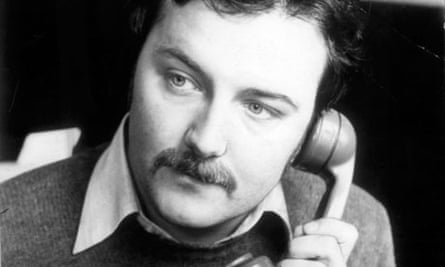
The secret lodger had broken in through an upstairs window; Galloway has no idea who it was, but is urging me to "emphasise that no one can do it now because I've got CCTV and alarms and so on" when the division bell goes off. "I must vote! I must vote, for fear of the media!" In his previous post as MP for Bethnal Green and Bow, his abysmal voting record was cited by critics as proof that he doesn't do his job. But he points out indignantly: "Voting is not the same as attendance." Representing neither the government nor opposition, "I have no means of voting an abstention. You just don't vote, and then you look like you weren't here. But as I always said, the CCTV cameras prove I'm here every day." And off he strides to vote, proud and alone.
We had talked a great deal about the role of religion in politics, and could not have disagreed more. I thought it outrageous to urge voters in Bradford, as he did, to vote for him or fear the wrath of judgment day. Galloway can't see the problem at all: "I believe that, on judgment day, people have to answer for what they did." When I ask if he is troubled that many voters thought he had converted to Islam, he replies: "Well, I don't think many of them are interested in my religion" – which is pretty rich, considering he put out a leaflet all about which candidate was more of a Muslim. Contrary to every report I've read, he doesn't deny writing the leaflet himself. I think he is ludicrously slippery about invoking religion, playing it both ways to suit his own purposes, but, as he says, we are never going to agree because he doesn't think politics should be secular. "So it's apples and pears, dear."
He never, however, gave any indication that he was anything other than the Catholic he was born and raised. After the New Statesman article appears, we speak again. "I didn't tell you that I'm a Catholic," he reminds me – and, parsing the transcript, I realise he never explicitly did, though he certainly allowed that impression to go unqueried. Does he believe in Allah? "I believe in God." Is he a Catholic or a Muslim? "I'm not discussing my personal religious beliefs." But we had talked for ever about the importance of his religious beliefs to his politics. Why won't he say what they are? "It's not necessary."
The magazine claims he did not deny that the conversion ceremony took place. Galloway says his denial is on tape – and so now he is going to sue the New Statesman. "Not because converting to Islam is defamatory. But calling me a liar is." And so the great Galloway soap opera is back once again, a Technicolor melodrama as complicated and compelling and crazy as ever.
"To be honest, I never felt that I would never be back. And I don't feel like I've been away."
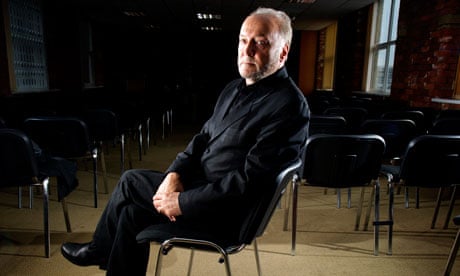
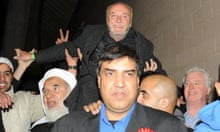






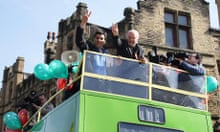

Comments (…)
Sign in or create your Guardian account to join the discussion